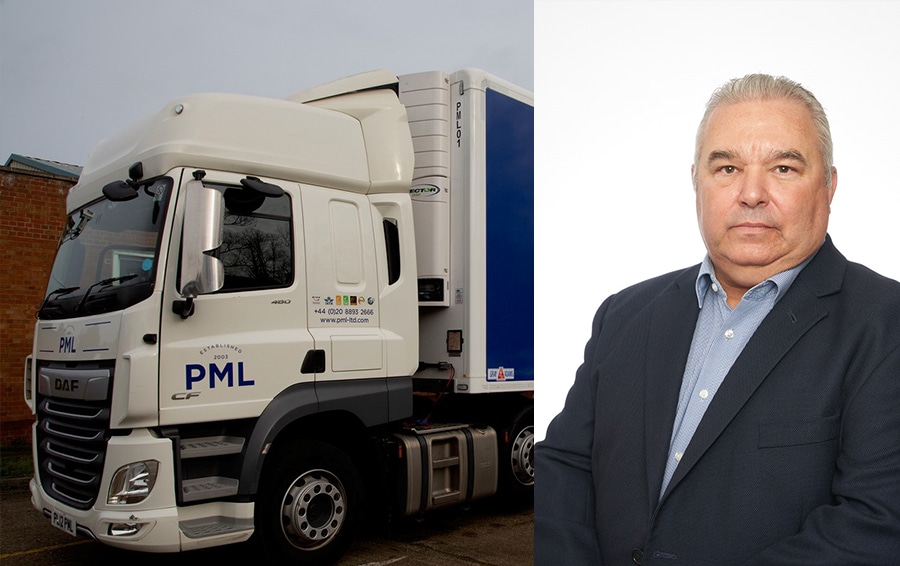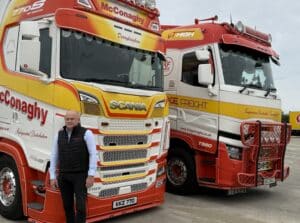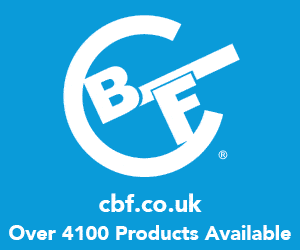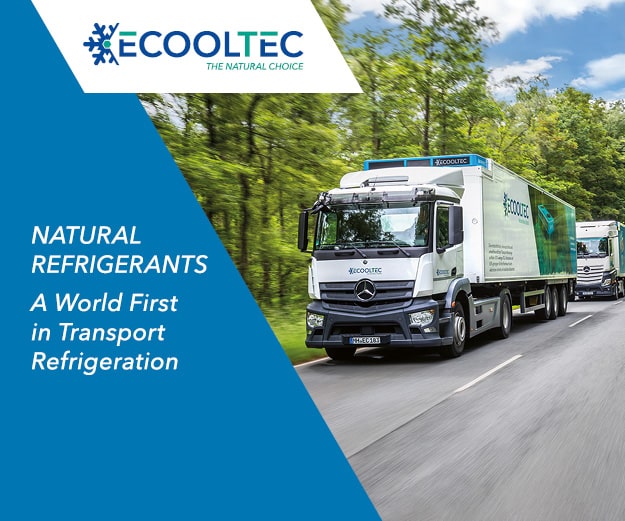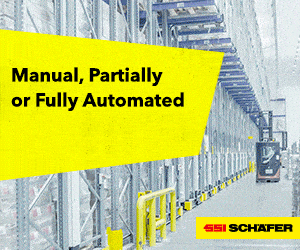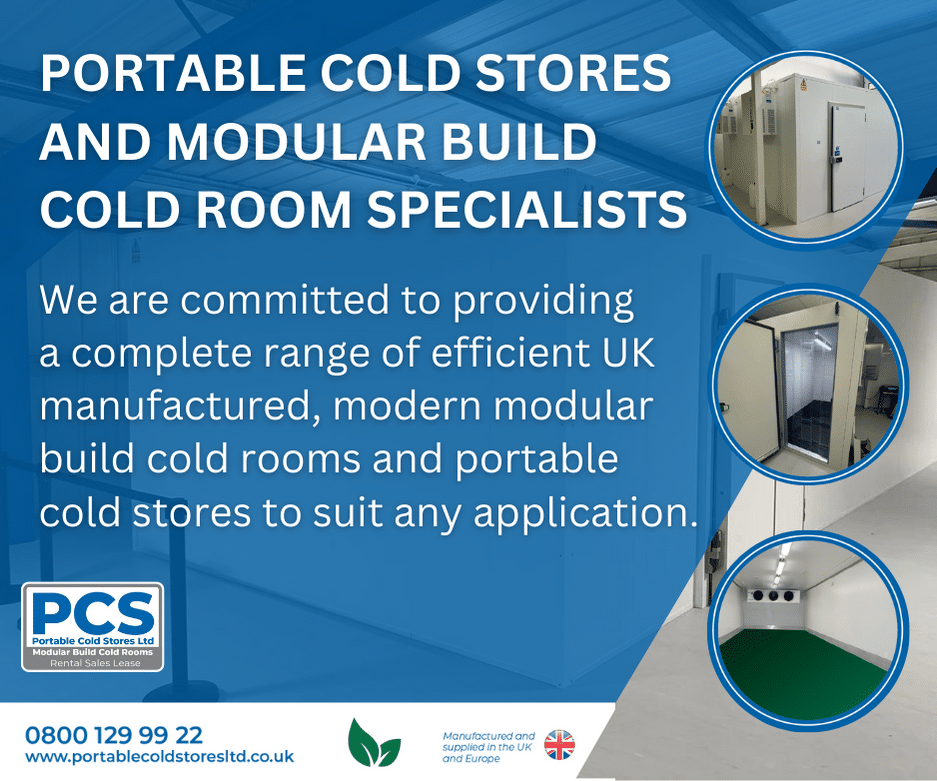Question: How did you get into the temperature-controlled distribution sector and what is your role within PML?
I originally started PML (Perishable Movements Ltd) back in 2003 with two colleagues – Colin Parry-Williams and Nick Wright with each member of the founding team investing £50,000 in the start-up.
20 years on and I’m now managing director of a business currently regarded as a leading player in global world-class logistics and supply chain solutions.
My father was an engineer in the petrochemical industry and his job took the family to Africa (Algeria) where I lived for 15 years, attending a French lycée.
Upon return to the UK my first job was as a radiographer assistant but after I was made redundant, my linguistic skills (English, Arabic and French) resulted in being snapped up by All Transport as a trainee import clerk.
All Transport was later bought by Burlington Air Express (now BAX Global) and it was here that I got my first taste of the perishable goods market. A good friend at work took a job at Saturn Freight Systems and when he decided that the perishable sector was not for him, he put me forward for his job. I stayed there for a considerable period of time and then pursued other roles to broaden my experience and further hone my expertise.
During this period, I met with Colin Parry-Williams who questioned why I was investing so much time building up companies for other people, when I clearly had the requisite knowledge, dedication, and entrepreneurial skill to branch out on my own. So, myself and colleague Nick Wright set up PML, with Colin backing the new business venture.
Today PML operates out of three key sites, with its headquarters in Heathrow, London; a bonded warehouse facility and BCP at Spalding Lincs (in partnership with FreshLinc) and a state-of-the-art satellite transport and logistics hub in Lympne, Kent which opened in January 2022. In addition, PML has offices in East Africa from which the company charters its own air freight flights departing from Nairobi and flying to Heathrow on a twice weekly rotation.
Question: Can you firstly tell us what temperature-controlled vehicles PML operates?
PML operates a total fleet of 30 HGVs and we’ve tripled our fleet of lorries – representing an investment of £2m – to cater for the growing demand for our services as the no1 player in the transfer of perishable goods. We have 15 lorries based at our new £6m state-of-the-art Kent transport and logistics hub, 11 at the Heathrow HQ and a further four at our Portsmouth site to service both Portsmouth and Southampton ports.
All of the above vehicles include temperature control features, including five Cool Liner refrigerated trailers from Krone. These dual temperature refrigerated trailers include a flexible, ceiling-mounted air duct to evenly distribute cold air, as well as a leak-proof floor tray and water-tight aluminium kick strip.
A dual temperature feature provides PML with the potential to split loads, therefore maximising transport efficiency with zero compromise on the company’s renowned reputation for excellence in the transfer of highly perishable goods.
PML also operates 37 trailers in total, 10 of which skeletal trailers fitted with gensets to enable them to power refrigerated containers and 16 refrigerated trailers.
Question: What has been the most important technical development in your temperature-controlled bodies and refrigeration systems in recent years and how has it impacted on your operations within PML?
The most important technical development in recent years has been the £500,000 investment in six new state-of-the-art trucks from Gray & Adams, which represented the UK’s first refrigerated trailers to feature a powered roller bed floor system.
The innovative power roller bed floor system was first developed 10 years ago and enables the automated loading / unloading of containers via a series of drive rollers that are built into the floor surface of the trailer. The benefits of this system are that cargo can be loaded / unloaded without the input of personnel, making it easier to accurately control the speed of the discharge and therefore offering heightened safety. Although they have been previously used in factories, the new PML trailers denoted the first time this technology has been applied to a refrigerated trailer. In addition, the new trucks include electronic / pneumatic controls to complement the refrigerated environment and the very latest fridge unit system which produces less carbon emissions.
Question: Are you using telematics across your fleet currently? If so, what advantages do you see this gives your clients?
Yes, we are. We have a telematics system which incorporates the ability for us to track when the vehicle arrives / departs destinations, delivers updates on delays and ETA to customer site, providing us with the opportunity to keep the customer updated at all times on the whereabouts of their consignment and most importantly, an accurate arrival time.
The system also offers updates in terms of a driver’s location, how many hours he / she has driven, how much fuel is being consumed and therefore how they are driving the vehicle, enabling us to have an accurate picture of driver performance.
Question: Customer needs are constantly changing, so what are you finding is now the biggest request from your customers?
The most important need for our customers is simple – to get the goods to their destination within the shortest time frame to maximise shelf life. Everything that we do is geared towards improving shelf life and providing a best-in-class service.
Question: What environmental measures does PML incorporate to ensure best practice?
As a business we are constantly reviewing opportunities to improve our carbon footprint. For its part, PML has researched the opportunity to switch to electric trucks, as well as reviewing the potential to move to more sustainable fuel types. To date, despite investing considerable time to seek out suitable alternatives, the options remain very limited and are currently not commercially viable.
The entire fleet of PML trucks are Euro VI compliant, which represents a positive step towards controlling carbon monoxide, hydrocarbon and nitrogen oxide emissions.
The Sales Director has taken delivery of an electric company car and as and when company car renewals arise, PML will look at a shift toward electric or at least hybrid vehicles. This is despite the hefty price tag associated with such purchases, an investment that is worthwhile given the clear benefits to the environment.
The Heathrow 64,000 square foot warehouse regularly receives and packs consignments of food and as such, generates a substantial amount of cardboard and polythene-based packaging. The business now recycles all of its cardboard and polythene to minimise the contribution to landfill and maximise the potential to reuse these materials.
As a logistics business, we have a significant number of employees who are charged with providing administrative support. The back office to PML’s operations is essential to its success and while it may not be able to fully address the emissions targets via our transport teams, the office is making great strides in adopting new environmentally friendly practices.
At our Heathrow headquarters, we have taken the decision to change 80% of our lighting to being motion-sensor driven, resulting in a reduction in electricity consumption which in turn, will negatively impact on the business’s carbon emissions footprint.
Our Kent transport and logistics hub features solar panels which will also help to reduce electricity usage and therefore will contribute to a drop in carbon emissions.
Question: The last 24 months has thrown us all a curve ball, how has business been for PML since the pandemic started?
PML continued to operate throughout the pandemic and indeed our Operations Director, Ryan Parr was heralded as a ‘special hero’ by the Fresh Produce Consortium, in recognition of his significant contribution in the face of the challenging circumstances associated with the pandemic. When the full impact of the global coronavirus pandemic began to play out in terms of the difficulties associated with maintaining the transfer of important food supplies both within the UK and abroad, Ryan worked tirelessly, putting in 15-16-hour days, seven days a week, co-ordinating between 10 and 20 trucks a day to facilitate the safe arrival of produce that would previously have been transferred by air. He was also accountable for identifying three to four flights a day out of the UK and Europe, to enable the export of goods from this country and thanks to his innovative thinking and refusal to accept defeat, not a single client was compromised, and every consignment was successfully delivered to its intended destination.
In addition to the pandemic, PML has had to work through the chaos associated with Brexit, providing customers with the appropriate guidance to enable them to export / import goods in line with constantly changing rules and regulation.
Added to this have been the challenges associated with rising fuel costs, increasing freight charges – especially for air freight, impact of extending London’s low emissions zone, HGV driver shortage and more recently, strike action at the major ports and airports.
Despite these testing conditions, and in a climate where many of our competitors have had to close, PML has not only continued to operate, but business has expanded including the opening of our new £6m transport and logistics hub in Kent which extends to 220,000 sq.foot in total, incorporating a 44,000 sq. foot warehouse. The Lympne site represents a prime location for hauliers, due to the excellent proximity to the motorway network, Channel Tunnel, and the ports (Dover and Folkestone) while also benefiting from the absence of any charges / penalties associated with using the roads within the Greater London area affected by the new LEZ standards. In addition, the facility has achieved remote HRMC / DEFRA approved Border Control Post (previously known as a Border Inspection Post (BIP) status to enable a faster transit of consignments out of the Port of Dover.
Question: If you could give one piece of advice to a newcomer to our industry, what would it be?
Be prepared to have the patience of a saint to contend with the constant government U-turns and lack of consultation with those ultimately responsible for the supply of fresh food to the UK’s supermarkets!
Question: Lastly, would you like to share any news about your company that you feel would benefit the TCS&D readers?
Watch this space, PML continues to be an innovator within its sector and we have exciting plans for 2023!


